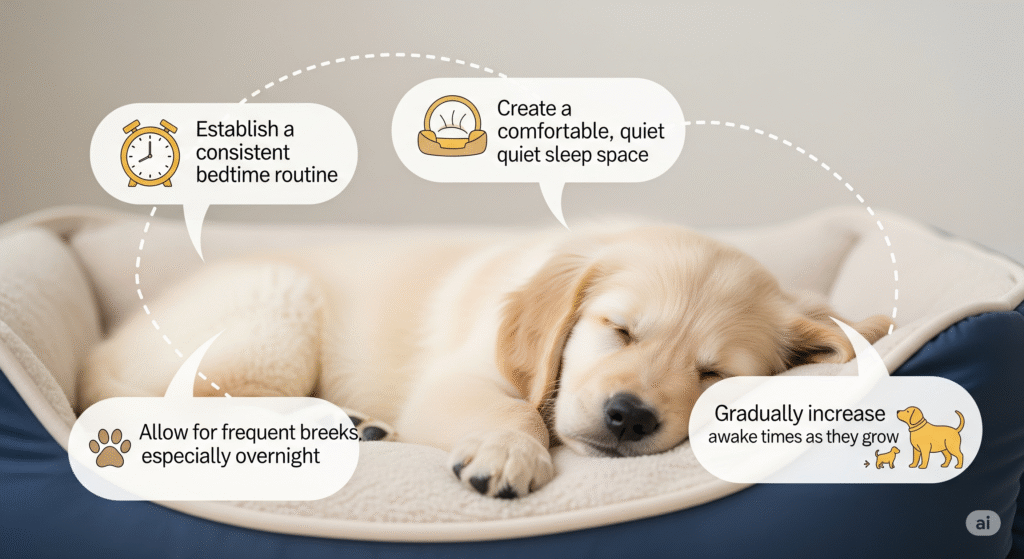
Bringing home a new puppy is one of the most exciting experiences for any dog lover. However, many new owners are surprised to learn that puppies sleep a lot more than adult dogs — often up to 18 to 20 hours a day. A well-planned puppy sleep schedule not only ensures your furry friend gets the rest they need but also helps with training, behavior, and overall development.
Understanding Puppy Sleep Needs
Puppies grow rapidly in their first year, and much of that growth happens while they sleep. During rest, their bodies produce growth hormones, strengthen their immune systems, and store the energy they’ll need for play and learning. Without enough quality sleep, puppies can become cranky, overexcited, or even prone to health issues.
Very young puppies, especially those under three months old, may need to nap every hour or two between short bursts of activity. As they get older, they will naturally start sleeping more during the night and less during the day, but it’s important to support this transition with a consistent schedule.
Creating a Nighttime Routine
A consistent bedtime routine will help your puppy learn when it’s time to sleep. Start winding down their activities about an hour before bed. Avoid overly exciting play or training right before bedtime, as it can leave them too energized to settle down. Instead, opt for a calm walk, some gentle petting, or quiet time in their crate.
Take your puppy outside for a final potty break right before bed to minimize the chances of nighttime accidents. Young puppies may still need to go out once or twice in the middle of the night, but as they grow and their bladder control improves, they will sleep for longer stretches.
Setting Up the Right Sleep Environment
Your puppy’s sleeping area should be quiet, comfortable, and free from distractions. Many owners use a crate for nighttime sleep, as it not only helps with potty training but also creates a safe den-like environment where the puppy feels secure. If you’re crate training, make sure it’s the right size — large enough for your puppy to stand up and turn around, but not so big that they can use one end as a bathroom.
Bedding should be soft but washable, as accidents are bound to happen in the early weeks. Some puppies also sleep better with a soft blanket that smells like their mother or littermates, or with a safe chew toy to comfort them.
Daytime Nap Management
While nighttime sleep is important, so are daytime naps. Puppies can easily become overtired, which may lead to hyperactive behavior, excessive nipping, or difficulty focusing during training. Schedule several short nap periods throughout the day, ideally after playtime, training sessions, or meals.
It’s also important to give your puppy a designated nap spot where they won’t be disturbed. This could be their crate, a dog bed in a quiet corner, or a cozy spot in a safe room. Over time, they will learn to settle themselves down when they feel tired.
Adjusting Sleep Schedules by Age
Puppy sleep needs change as they grow:
- 8–12 weeks old – Expect 18–20 hours of sleep per day, with naps every couple of hours. Nighttime sleep may be interrupted for potty breaks.
- 3–6 months old – Around 16–18 hours of sleep, with longer stretches at night and fewer naps during the day.
- 6–12 months old – Closer to 14–16 hours of sleep per day, similar to adult dogs, but still with occasional naps.
Being aware of these changes will help you adjust your routine accordingly and make the transition smoother for your puppy.
Common Sleep Problems and How to Solve Them
Some puppies struggle to settle at night, especially in the first few weeks after coming home. Whining, barking, or scratching at the crate can be signs of loneliness or anxiety. While it’s tempting to give in and bring your puppy to bed, doing so too soon can make crate training more difficult. Instead, place the crate near your bed so they can hear and smell you, which provides reassurance without breaking their training routine.
If your puppy wakes up in the middle of the night, keep potty breaks calm and quiet. Avoid playing, feeding, or engaging too much, as this can make them think nighttime is for fun instead of rest.
Final Thoughts
A consistent puppy sleep schedule sets the foundation for healthy growth, good behavior, and a happy relationship between you and your new furry friend. By understanding their sleep needs, creating a comfortable sleeping environment, and sticking to a routine, you’ll help your puppy settle into your home and develop positive lifelong habits. With time, patience, and love, your puppy will learn to sleep through the night, leaving you both well-rested and ready for each new day together. PetsDogPuppy
